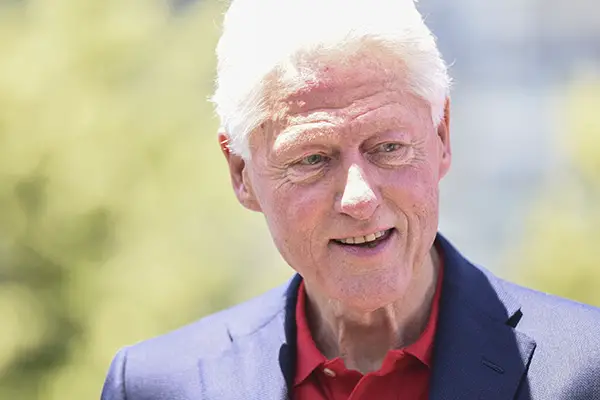Former President Bill Clinton’s spokesperson has responded after thousands of emails from Jeffrey Epstein’s estate sparked renewed scrutiny of high-profile figures connected to the late convicted sex offender. The controversy intensified following President Donald Trump’s call for a Department of Justice investigation into Clinton and other prominent Democrats mentioned in the emails.
The House Oversight Committee released the emails from Epstein’s estate, which included references to Trump, Clinton, and other influential individuals. Among the correspondence was a 2015 email in which Epstein wrote that Clinton “never ever” went to his private island in the U.S. Virgin Islands, despite allegations to the contrary. The documents also contained a 2018 exchange between Jeffrey Epstein and his brother Mark Epstein that mentioned “Trump blowing Bubba,” sparking widespread speculation on social media.
Angel Urena, Clinton’s spokesperson, addressed the allegations in a post on X. “These emails prove Bill Clinton did nothing and knew nothing,” Urena stated. The response came as Trump announced he would ask Attorney General Pam Bondi and the Department of Justice to investigate Epstein’s involvement and relationship with Clinton, former Treasury Secretary Larry Summers, LinkedIn co-founder Reid Hoffman, and financial institution JPMorgan Chase.
Mark Epstein quickly moved to clarify the “Bubba” reference, which many interpreted as Clinton’s longtime nickname. In a phone interview with NewsNation’s anchor Chris Cuomo, Mark apologized to Clinton and insisted the reference had nothing to do with the former president. He denied that “Bubba” referred to Clinton and expressed regret that the email exchange had drawn the ex-president into the controversy. Mark’s spokesperson Ali Clark reinforced this position, stating that “Bubba” is a private individual who is not a public figure.
The email controversy emerged as House Democrats drew attention to other correspondence in which Epstein made allegations about Trump. One email mentioned that an alleged victim “spent hours” at Epstein’s house with Trump, while another suggested Trump “knew about the girls.” In an email to Ghislaine Maxwell, Epstein referenced Trump as “the dog that hasn’t barked,” noting he had never been mentioned by a victim despite the alleged encounters.
Trump responded by characterizing the focus on the Epstein emails as a politically motivated distraction. He requested the DOJ investigation, claiming Democrats were using what he called the “Epstein Hoax” to deflect from other issues. Attorney General Bondi confirmed she was launching the investigation and assigned Jay Clayton, the U.S. attorney for the Southern District of New York, to lead the probe with what she described as “urgency and integrity.” Former Trump advisor Steve Bannon has also weighed in on the controversy surrounding the document release.
Flight logs show both presidents traveled on Epstein’s private planes, though the circumstances differed significantly. According to available records, Clinton took at least 17 flights on Epstein’s aircraft for international trips. Trump flew on Epstein’s planes at least eight times, according to available records. The logs do not indicate that either man traveled to Epstein’s island, though flight records show Clinton flew from the U.S. Virgin Islands to Palm Beach, Florida, on one occasion.
The released documents represent only a portion of the materials related to Epstein’s criminal case. His associate Maxwell was later convicted on related charges. The case has continued to generate public interest due to Epstein’s extensive connections to influential figures in politics, business, and entertainment.
Beyond Clinton and Trump, the emails revealed that Epstein maintained contact with numerous prominent individuals. Former Treasury Secretary Summers corresponded with Epstein, according to the released documents. Hoffman was also mentioned in communications involving Epstein. JP Morgan Chase, which served as Epstein’s banker, previously settled lawsuits from victims and the U.S. Virgin Islands.
The White House maintained that the emails prove Trump did nothing wrong. The administration’s position contrasts with bipartisan pressure in Congress to release all remaining Epstein-related files.
Republican allies have expressed concern that Trump’s focus on the issue may amplify rather than diminish public attention to his past association with Epstein. The president and the financier were friendly for years before a reported falling out. Despite the controversy, Trump has also called for transparency regarding the Epstein files.
As the DOJ investigation moves forward under Clayton’s leadership, questions remain about what additional information may emerge from the thousands of documents in the Epstein estate. The case continues to intersect with contemporary politics, raising questions about accountability and transparency regarding the financier’s extensive network of high-profile contacts across multiple decades.

